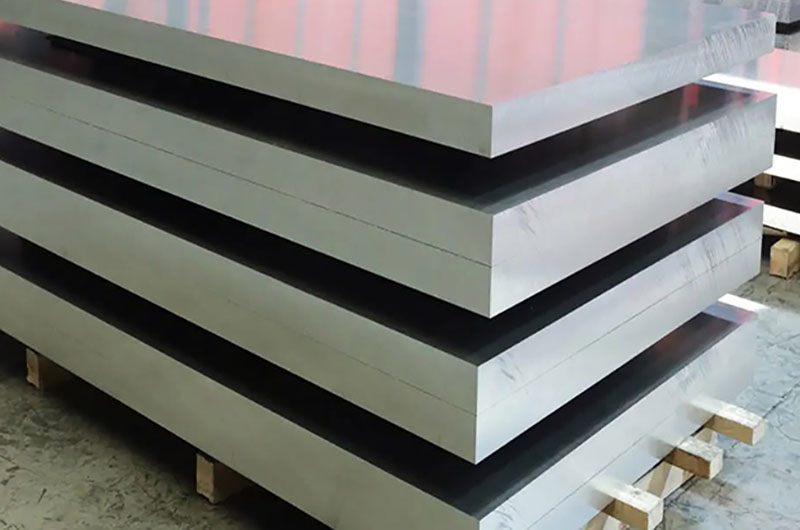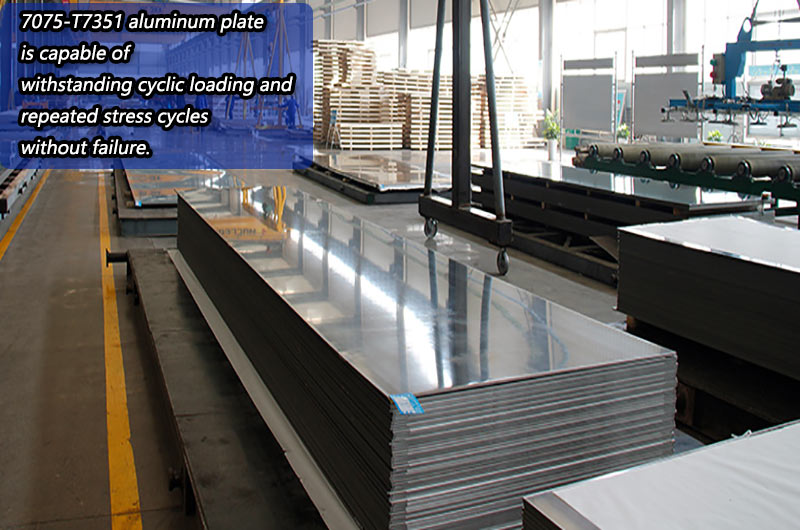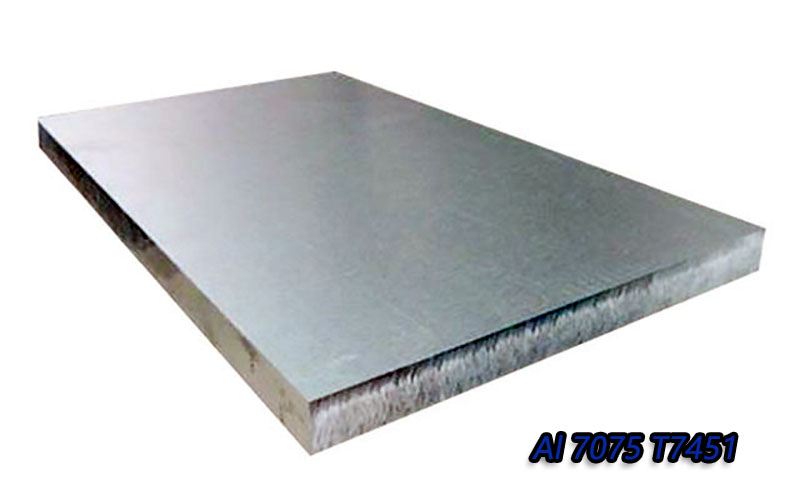7075 T7451 Aluminum Plate Sheet
Standard: ASTM B209, QQ-A-250/4 Competitive Price
7075-T7451 aluminum is a specific temper of the 7075 aluminum alloy. The "T7451" temper designation indicates the heat treatment and mechanical properties of the material.
7075 aluminum is a high-strength aluminum alloy known for its excellent strength-to-weight ratio and good fatigue resistance. It is mainly composed of aluminum, with zinc as the main alloying element, and small amounts of magnesium, copper, and chromium.

7075-T7451 aluminum has high tensile strength, typically about 650 MPa (94, 000 psi), with a yield strength of about 570 MPa (83, 000 psi). It exhibits good fatigue resistance and maintains its strength properties at elevated temperatures, making it suitable for applications requiring high strength and toughness, such as aerospace and structural components.
NOTE: Specific properties and availability of 7075-T7451 Aluminum may vary by manufacturer and specific requirements. Therefore, it is recommended to consult the supplier or refer to the relevant material specification for accurate information relevant to your application.
Aluminum 7075-t7451 Properties
- Solution heat treatment: The material undergoes a solution heat treatment process in which it is heated to a specific temperature range and then rapidly quenched to dissolve alloying elements and obtain a uniform microstructure.
- Stabilization: After solution heat treatment, the material is stabilized by holding the material at a specific temperature for some time to relieve residual stress and enhance dimensional stability.
- Precipitation hardening: The material is then subjected to a precipitation hardening treatment, also known as artificial aging. It heats the material to a specific temperature range and holds it for a precise time to allow fine precipitates to form in the aluminum matrix. This process increases the strength and hardness of the material.
7075 T7451 Aluminum Plate Params
- Grade: 7075
- Temper: T7451, T6, T651, etc
- Thickness: 0.3mm~300mm
- Standard Size: 1500*3000mm, 1525*3660mm
7075 T7451 Aluminum Mechanical Properties
| Property | Typical Value |
|---|---|
| Tensile Strength | 570 MPa (82, 700 psi) |
| Yield Strength | 480 MPa (69, 600 psi) |
| Elongation | 9% - 11% |
| Hardness | Approximately 150 Brinell |
| Fatigue Strength | Good |
Fatigue Strength: 7075-T7351 aluminum has good fatigue strength, allowing it to withstand cyclic loading and repeated stress cycles without failure.

Note: These mechanical properties are typical values and may vary based on factors such as manufacturing process, specific alloy composition, and test method. We always recommend that you refer to the relevant material specification or consult an expert in the field for accurate and up-to-date information on the mechanical properties of 7075-T7351 aluminum for your specific application.
7075 t7451 Aluminum for Sale
Common gauges, sizes and thickness ranges for 7075-T7451 aluminum plates may vary depending on the supplier and specific requirements. However, here are some general guidelines:
Specifications: Common specifications for 7075-T7451 aluminum plate include ASTM B209 (American Society for Testing and Materials) and AMS 4045 (Aerospace Material Specification), among others.
Common size: 7075-T7451 aluminum plate size can be customized according to application requirements. Common sheet sizes include:
| Property | Typical Value |
|---|---|
| Width | 36 - 72 inches (914.4 - 1828.8 mm) |
| Length | 36 - 72 inches (914.4 mm - 1828.8 mm) |
Common thickness range: The common thickness range of 7075-T7451 aluminum plate includes but is not limited to the following:
| Type | Thickness (inches) | Thickness (mm) |
|---|---|---|
| Sheets | Less than 0.25 | Less than 6.35 |
| Plate | 0.25 - 2 | 6.35 - 50.8 |
| Thick Plate | Greater than 2 | Greater than 50.8 |
It is important to note that these size and thickness ranges are general guidelines only and may vary depending on suppliers, production capabilities, and specific requirements. It is recommended to consult the supplier or refer to their catalogs for accurate information on available sizes, dimensions, and thicknesses of 7075-T7451 Aluminum Plates.
7075 T7451 Aluminum Plate Stock List
| Product | Thickness (mm) | Thickness (in) | Size (Width x Height) |
| 1/4" 7075 T7451 Aluminum Plate | 6.35 | 1/4" | 1000mm x 2000mm |
| 3/8" 7075 T7451 Aluminum Plate | 9.525 | 3/8" | 1250mm x 2500mm |
| 1/2" 7075 T7451 Aluminum Plate | 12.7 | 1/2" | 1500mm x 3000mm |
| 5/8" 7075 T7451 Aluminum Plate | 15.875 | 5/8" | 1000mm x 2000mm |
| 3/4" 7075 T7451 Aluminum Plate | 19.05 | 3/4" | 1250mm x 2500mm |
| 1" 7075 T7451 Aluminum Plate | 25.4 | 1" | 1500mm x 3000mm |
| 1.25" 7075 T7451 Aluminum Plate | 31.75 | 1.25" | 1000mm x 2000mm |
| 1.5" 7075 T7451 Aluminum Plate | 38.1 | 1.5" | 1250mm x 2500mm |
| 1.75" 7075 T7451 Aluminum Plate | 44.45 | 1.75" | 1500mm x 3000mm |
| 2" 7075 T7451 Aluminum Plate | 50.8 | 2" | 1000mm x 2000mm |
| 2.25" 7075 T7451 Aluminum Plate | 57.15 | 2.25" | 1250mm x 2500mm |
| 2.5" 7075 T7451 Aluminum Plate | 63.5 | 2.5" | 1500mm x 3000mm |
| 3" 7075 T7451 Aluminum Plate | 76.2 | 3" | 1000mm x 2000mm |
| 3.5" 7075 T7451 Aluminum Plate | 88.9 | 3.5" | 1250mm x 2500mm |
| 4" 7075 T7451 Aluminum Plate | 101.6 | 4" | 1500mm x 3000mm |
| 4.5" 7075 T7451 Aluminum Plate | 114.3 | 4.5" | 1000mm x 2000mm |
| 5" 7075 T7451 Aluminum Plate | 127 | 5" | 1250mm x 2500mm |
| 5.5" 7075 T7451 Aluminum Plate | 139.7 | 5.5" | 1500mm x 3000mm |
| 6" 7075 T7451 Aluminum Plate | 152.4 | 6" | 1000mm x 2000mm |
| 6.5" 7075 T7451 Aluminum Plate | 165.1 | 6.5" | 1250mm x 2500mm |
What is the Difference between 7075-T7451 and 7075-T7351?
The main difference between 7075-T7451 and 7075-T7351 is the heat treatment process and resulting mechanical properties. Here's a comparison between the two:
Heat Treatment
- 7075-T7451: This temper involves solution heat treatment, quenching, and aging. The material is first solution heat treated to dissolve alloying elements and then quenched to obtain a uniform microstructure. After quenching, a stabilization treatment is performed to eliminate residual stress. Finally, artificial aging is performed to achieve the desired mechanical properties.
- 7075-T7351: This temper also involves solution heat treatment and stabilization. However, it typically undergoes a longer and more rigorous stabilization process than T7451, which helps to enhance dimensional stability and reduce residual stresses.

Mechanical Properties
- Tensile Strength: Both the T7451 and T7351 variants of 7075 aluminum have high tensile strength. However, T7451 generally exhibits slightly higher tensile strength compared to T7351.
- Yield Strength: T7451 and T7351 tempered designs provide comparable yield strengths, with T7351 having slightly higher values in some cases.
- Elongation: The elongation at break for both tempers is typically in the range of 9% to 11%.
- Hardness: The hardness of T7451 and T7351 is similar, usually around 150 Brinell.
Application and Suitability
- T7451 and T7351 are typically used in aerospace and high-performance applications requiring high strength, good fatigue resistance, and dimensional stability.
- T7451 is generally suitable for applications where maximum tensile and yield strength is a priority, such as aircraft structural components and high-stress applications.
- T7351 is well suited for applications where dimensional stability is a priority, such as precision machining and tooling, as the longer stabilization process increases the material's resistance to deformation and warpage.
It is worth noting that the exact properties and characteristics of these tempering conditions may vary depending on specific manufacturing processes, heat treatment parameters, and other factors. It is recommended to consult the relevant material specification or consult an expert for accurate information and to ensure suitability for your particular application.
What is the Difference between 7050 T7451 and 7075?
The main difference between 7050-T7451 and 7075 aluminum is their alloy composition and resulting properties. Here's a comparison between the two:
-
Alloy Composition
- 7050 Aluminum: Mainly composed of aluminum with zinc as the main alloying element and small amounts of copper and magnesium.
- 7075 Aluminum: Mainly composed of aluminum with zinc as the main alloying element and small amounts of magnesium, copper, and chromium.
- Strength: Both alloys are known for their high strength-to-weight ratio. However, 7050-T7451 generally exhibits slightly higher strength compared to 7075 aluminum. The tensile and yield strength of 7050-T7451 is generally higher than that of 7075 aluminum.
- Fatigue Resistance: 7050-T7451 Aluminum is known for its excellent fatigue resistance, making it ideal for applications subject to cyclic loading. While 7075 aluminum also has good fatigue resistance, 7050-T7451 generally outperforms it in this regard.
- Corrosion Resistance: Both alloys have good corrosion resistance, but 7075 aluminum has better atmospheric corrosion resistance than 7050-T7451. However, 7050-T7451 exhibits better resistance to stress corrosion cracking than 7075 aluminum.
- Weldability: 7075 aluminum is generally considered easier to weld than 7050-T7451. However, with proper technique and precautions, both alloys can be welded successfully.
- Applications: Due to its high strength and excellent fatigue resistance, 7050-T7451 aluminum is commonly used in aerospace applications such as aircraft wing structures and fuselage frames. 7075 aluminum is also widely used in industries such as aerospace and automotive, marine, and sporting goods.
It is worth noting that the specific properties and characteristics of these alloys may vary depending on the specific manufacturing process, heat treatment, and other factors. It is always recommended that you refer to the relevant material specification or consult an expert for accurate information and to ensure suitability for your particular application.
7075 T7451 Aluminum related searches
- 7075 T7451 Aerospace Aluminum Forging
- 7075 T7451 Aerospace Aluminum Profile Extrusion
- 7050 t7451 aluminum properties
- 7050 t7451 plate
- 7050 t7451 ams 4050
- What is 7050 T7451 material?

